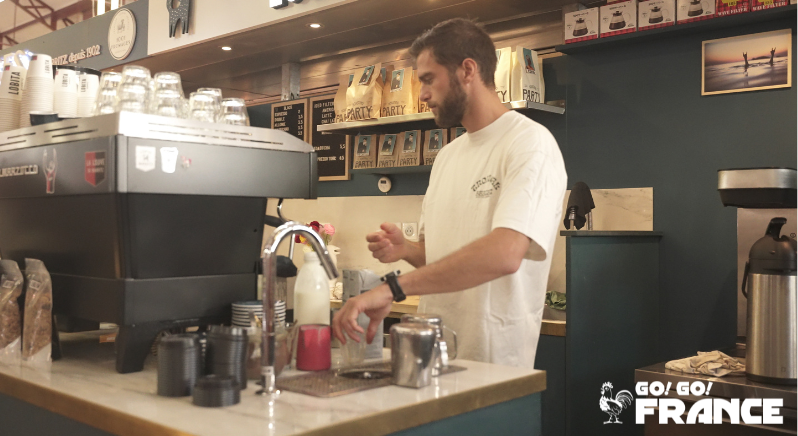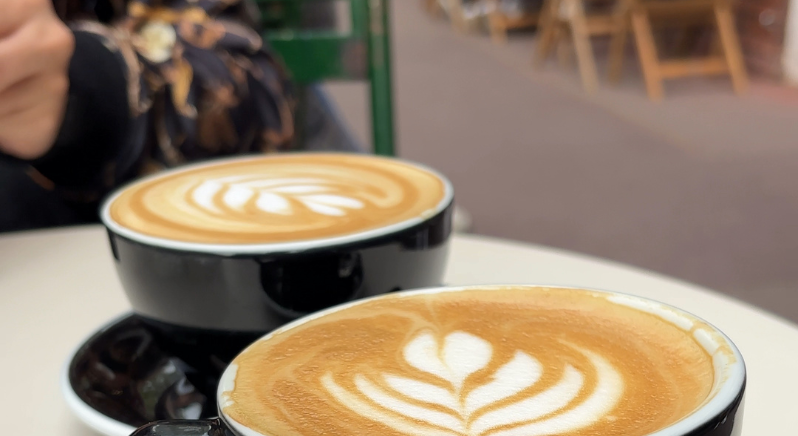Whether sipping an espresso at a bustling Parisian café or enjoying a café crème in a quiet provincial town, the French approach to coffee is steeped in tradition, etiquette, and ambiance.
Keep reading to learn more about the coffee culture in France.
French press or moka pot
Nowadays, French coffee is typically made using an espresso machine, but many French people still like to use a French press or moka pot at home to prepare their coffee.
The French press involves steeping coarsely ground coffee in hot water for several minutes before pressing down a plunger to separate the grounds from the liquid. This technique produces a rich, full-bodied coffee. The moka pot, though of Italian origin, is also commonly used in French households.

Types of coffee
Understanding the different coffee options in France is essential for those looking to enjoy the local café culture:
- Espresso: The standard coffee order in France is a small, strong shot of espresso.
- Café allongé: Similar to an Americano, this is an espresso with added hot water for a milder taste.
- Café crème: A popular breakfast choice, this is similar to a cappuccino, with equal parts espresso and steamed milk, often served in a larger cup.
- Café noisette: An espresso with a dash of milk, resembling a macchiato.
- Café au lait: Typically enjoyed at home rather than in cafés, this is coffee mixed with warm milk, served in a large bowl.
- Décaféiné: A decaffeinated version of espresso for those looking to avoid caffeine.Café latte – Made with a larger amount of steamed milk than a café crème, creating a smooth, milky coffee.
- Cappuccino: Similar to a café crème but topped with frothed milk and often dusted with cocoa powder.
- Café macchiato: An espresso “stained” with a small amount of milk or milk foam.
- Café glacé: Iced coffee, sometimes served sweetened or with milk for a refreshing alternative.
- Café viennois: An espresso topped with whipped cream, creating a rich and indulgent drink.
Coffee and accompaniments
Coffee in France is often enjoyed with pastries or light snacks. In the morning, a café crème pairs perfectly with a croissant or pain au chocolat. After meals, an espresso is typically served alone or with a small square of dark chocolate or small biscuit.
Coffee and breakfast
In France, the most traditional breakfast consists of a café au lait or café crème, accompanied by a croissant, pain au chocolat, or a simple slice of fresh baguette spread with butter and jam.
Unlike in other countries where coffee might be grabbed quickly, French people often take a moment to enjoy their morning ritual. At home, coffee is sometimes served in a wide bowl, making it easier to dip bread or pastries into the warm beverage.
More about eating breakfast in France: https://gogofrance.com/en/blog/breakfast-in-france-culture-and-traditions/
Coffee and social ritual
Coffee in France plays a vital role in social interactions. It is customary to take a coffee break at work, often called a “pause-café,” which serves as a moment to relax and connect with colleagues. Friends frequently meet over coffee, and when hosting guests at home, it is a common courtesy to offer them a cup of coffee.

Famous café in France
Café de Flore, one of the most famous cafés in Paris, has long been associated with literature, philosophy, and artistic discussions. Located in the Saint-Germain-des-Prés district, it became a gathering place for some of the greatest intellectuals of the 20th century.
Jean-Paul Sartre and Simone de Beauvoir famously spent countless hours here, crafting their existentialist philosophy and debating ideas. Other notable patrons included Albert Camus, Ernest Hemingway, Pablo Picasso, and Guillaume Apollinaire.
Visit our blog for more content about the French language, culture, society, studying in France, travelling in France, and more!





